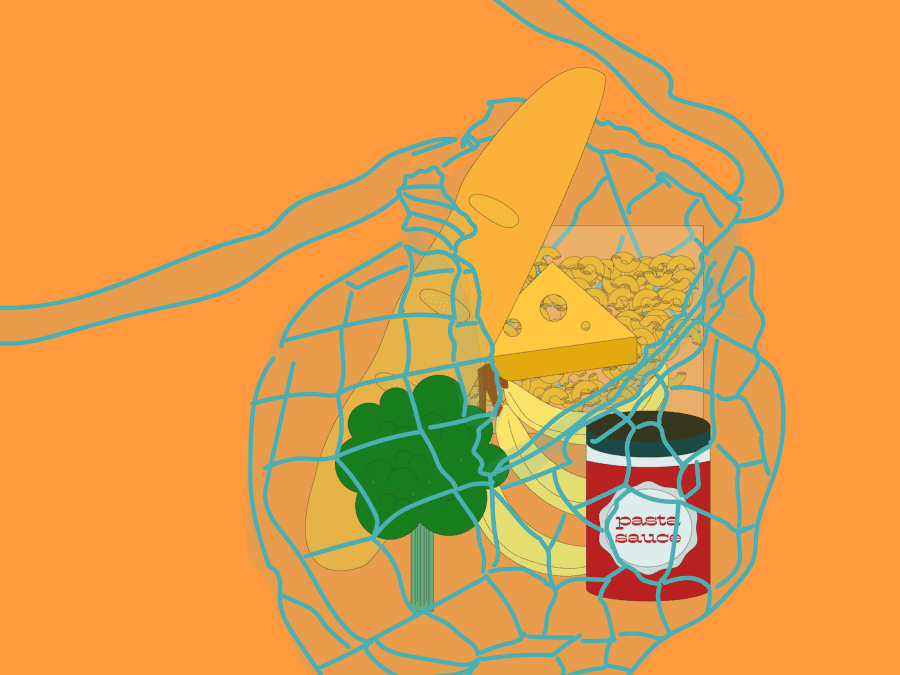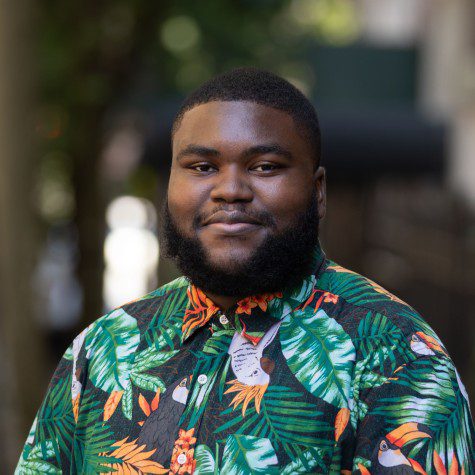Opinion: NYU’s food security initiatives are inadequate
NYU students make countless sacrifices to attend the university, but a meal should never be one. Food-insecure students deserve autonomy.
(Illustration by Susan Behrends Valenzuela)
December 1, 2022
On a recent Tuesday, while waiting in line to check out at the Palladium dining hall, I overheard a student quietly ask the cashier if they could use the Swipe it Forward program. The cashier gestured to an oddly placed, handwritten note that says the program is now offered at fewer dining locations, excluding Palladium. The revised Swipe it Forward program enables students to donate and request meal swipes at Lipton, Downstein, Third North, Jasper Kane and the Kosher Eatery.
As I prepared to offer to cover the student’s meal, another student who recently checked out offered first. This student’s impulsive reaction led me to a journey of self-reflection and meditation on how having access to food could directly impact a college student’s success, mental health and eating patterns.
“Once we near the end of each semester and year, students that have been saving them or not eating as much as they thought they would, now are caught up with a bunch of meal swipes,” Gallatin sophomore and Commuter Student Council president Mya Sato said. “Students aren’t being taught how to use their meal plans advantageously in a way that allows them to feel comfortable enough to space out their meals.”
For example, students can donate their meal swipes to people on scholarships who opted to receive a refund instead of keeping their meal plan, or to classmates who cannot focus during exams because they did not eat the night before. There are many instances of such harsh realities.
These are real stories of NYU students whose basic needs are sacrificed at the expense of obtaining a competitive education. Chronic college food insecurity, if left untreated, can sabotage otherwise capable students’ academic careers. Maslow’s hierarchy of needs, a theory of human motivation proposed by American psychologist Abraham Maslow, states that food is the most vital basic need for humans to achieve before pursuing higher-level needs. Self-actualization — the realization or fulfillment of one’s talents and potentialities — is at the top.
Student meal plan misuse is often due to a lack of education on budgeting and dining-specific jargon. NYU alum Jon Chin noticed this trend in 2013 when he created the Share Meals app, a peer-to-peer meal donation app.
In 2016, NYU established the Food Insecurity Working Group to address and understand the prevalence of food insecurity on campus. Chin and former Student Government Assembly chairperson Jakiyah Bradley were a part of the working group. Courtesy Meals — a short-term resource that grants students a one-time credit of 75 dining dollars — was created as a result of the 2016 findings. Students consistently use the program, which saw an exponential usage increase since the Spring of 2019, and has since steadily increased.
NYU has not expanded its food insecurity resources beyond Courtesy Meals, which is the only direct institutional solution to food insecurity. Students are currently limited to three Courtesy Meals requests per academic year. Under perfect circumstances, students can purchase 15 to 25 meal items with the 75 dining dollar allowance by using the NYU Eats $3 & $5 Deals program, but NYU does not currently offer students a guide on how to budget their funds.
I, along with former SGA chairperson Mehrin Ali, served on last year’s Food Insecurity Working Group, which resulted in skewed conclusions on a strategic approach to short-term food insecurity — some proposals included a reworked Courtesy Meals program, campus-wide food pantry and mirroring practices of our peer institutions. I argued that food insecurity discourse must center on long-term food security as a fundamental right of attending NYU.
Swipe it Forward is a burgeoning program that alleviates the burden of emergency food insecurity, and the Courtesy Meals program addresses short-term food insecurity. Both programs require a screening process to ensure that only students who need the resources can use them. Despite the pandemic provision, which allowed students to virtually apply for Courtesy Meals, students must now apply at designated locations.
Barriers, regardless of how small, can deter the students who need the resources the most from accessing them due to stigma-induced embarrassment. While these programs provide students with access, students have no autonomy. True food security grants food-insecure individuals autonomous access to food.
NYU must prioritize long-term, standardized resources to support the people behind the stories. The university competitively accepts pell-eligible students, who are overwhelmingly low-income or working-class students.
Regardless of income, NYU is a microcosm that brings people of all food access backgrounds together. For some students, lack of access to food is common. It is a reality after commuting home from campus, during breaks and the summer term, when dining halls are closed.
The key to sustainable food security initiatives at NYU is universality. The Food Pantry at Columbia serves Columbia University students, and now includes an option for students to order free groceries online for pickup at a centralized campus location. NYU does not have a centralized food pantry system, but rather departmental and school-specific operations — with many NYU students relying on external pantries in comparison to NYU’s food accessibility resources.
In order to combat food insecurity, NYU’s advocacy must center around food security as a goal rather than food insecurity as the problem.
Shamon Lawrence is the senator at-large for Black students and students experiencing food and basic needs insecurity on NYU’s student government.
WSN’s Opinion section strives to publish ideas worth discussing. The views presented in the Opinion section are solely the views of the writer.
Contact Shamon Lawrence at [email protected].

























































































































































